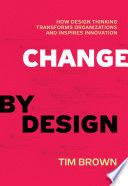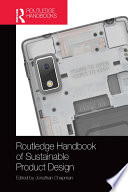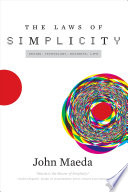At MentorCruise, we are all about making the most out of the experience of others. As part of that, we've connected and asked dozens of experts and professionals about their favourite Product Design books – and here are the answers.
Did you know? We have over 3,000 mentors available right now!
Understanding the concepts of Product Design starts with understanding the fundamentals. On your way to mastery, it's crucial for you to understand how certain concepts were derived, and why things work like they do. Starting with these resources is the best way to do so.

Our phones, computers, and appliances are made of hundreds of internal components, each precisely engineered to perform a certain function, but none intended to actually be seen. Through painstakingly executed, vividly detailed cross-section photography, Open Circuits reveals the surprising—and often accidental—beauty hiding inside the electronic components that drive our everyday devices.
Recommended by the experts and mentors at MentorCruise
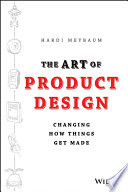
Embrace Open Engineering and accelerate the design and manufacturing processes. Product development is a team sport, but most companies don't practice it that way. Organizations should be drawing on the creativity of engaged customers and outsiders, but instead they rely on the same small group of internal "experts" for new ideas. Designers and engineers should be connecting with marketing, sa…
Recommended by the experts and mentors at MentorCruise
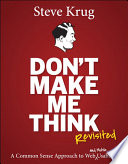
Since Don’t Make Me Think was first published in 2000, hundreds of thousands of Web designers and developers have relied on usability guru Steve Krug’s guide to help them understand the principles of intuitive navigation and information design. Witty, commonsensical, and eminently practical, it’s one of the best-loved and most recommended books on the subject. Now Steve returns with fresh pers…
Recommended by the experts and mentors at MentorCruise
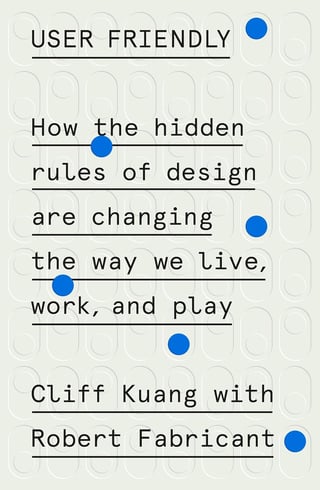
In User Friendly, Cliff Kuang and Robert Fabricant reveal the untold story of a paradigm that quietly rules our modern lives: the assumption that machines should anticipate what we need. Spanning over a century of sweeping changes, from women’s rights to the Great Depression to World War II to the rise of the digital era, this book unpacks the ways in which the world has been―and continues to …
Recommended by the experts and mentors at MentorCruise
In Change by Design, Tim Brown, CEO of IDEO, the celebrated innovation and design firm, shows how the techniques and strategies of design belong at every level of business. Change by Design is not a book by designers for designers; this is a book for creative leaders who seek to infuse design thinking into every level of an organization, product, or service to drive new alternatives for busine…
Recommended by the experts and mentors at MentorCruise
LEGO® bricks are design icons and marvels of engineering. Having remained virtually unchanged for over fifty years, the brick is still the center of the LEGO System in Play, in which each brick connects to every other brick, allowing the construction of almost anything you can imagine. LEGO minifigures may be the friendly smiling faces of the LEGO world, but bricks in all their different shape…
Recommended by the experts and mentors at MentorCruise
These books are not required for you to learn Product Design, but they are highly recommended for you to deepen your knowledge.

The Zombie Apocalypse Guide to 3D printing is written for the person who wants to use their printer to make practical, durable items for everyday use.Whether rebuilding civilization from your jungle hideaway, fighting off zombie hordes, or just printing a new plastic bit for your latest project, The Zombie Apocalypse Guide to 3D printing has what you need to get the job done. If you are going …
Recommended by the experts and mentors at MentorCruise
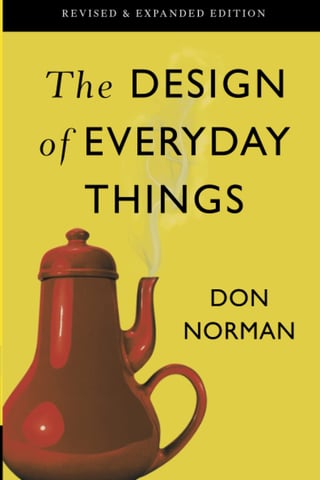
The fault, argues this ingenious -- even liberating -- book, lies not in ourselves, but in product design that ignores the needs of users and the principles of cognitive psychology. The problems range from ambiguous and hidden controls to arbitrary relationships between controls and functions, coupled with a lack of feedback or other assistance and unreasonable demands on memorization.
Recommended by the experts and mentors at MentorCruise
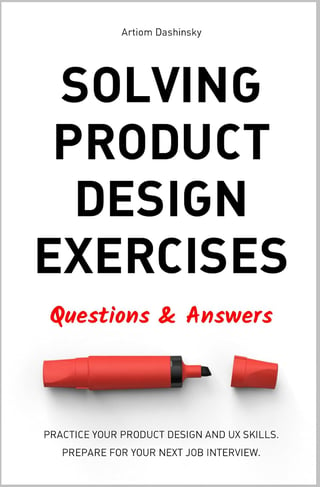
Learn how to solve and present exercises like these, that top startups use to interview designers for product design and UI/UX roles. Today top companies are looking for business-minded designers who are not just focused on visuals. With this book, you can practice this kind of mindset, prepare for job interviews, learn how to interview other designers and find concepts for projects for your p…
Recommended by the experts and mentors at MentorCruise
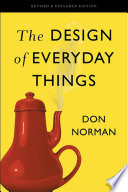
Design doesn't have to complicated, which is why this guide to human-centered design shows that usability is just as important as aesthetics. Even the smartest among us can feel inept as we fail to figure out which light switch or oven burner to turn on, or whether to push, pull, or slide a door. The Design of Everyday Things shows that good, usable design is possible. The rules are simple: ma…
Recommended by the experts and mentors at MentorCruise
As a cultivated form of invention, product design is a deeply human phenomenon that enables us to shape, modify and alter the world around us – for better or worse. The recent emergence of the sustainability imperative in product design compels us to recalibrate the parameters of good design in an unsustainable age. Written by designers, for designers, the Routledge Handbook of Sustainable Pro…
Recommended by the experts and mentors at MentorCruise
Ten laws of simplicity for business, technology, and design that teach us how to need less but get more. Finally, we are learning that simplicity equals sanity. We're rebelling against technology that's too complicated, DVD players with too many menus, and software accompanied by 75-megabyte "read me" manuals. The iPod's clean gadgetry has made simplicity hip. But sometimes we find ourselves c…
Recommended by the experts and mentors at MentorCruise
This list is curated by MentorCruise and can include Amazon affiliate links. Have any other suggestions? Add here.
There is no better source of accountability and motivation than having a personal mentor. What used to be impossible to find is now just two clicks away! All mentors are vetted & hands-on!
We've already delivered 1-on-1 mentorship to thousands of students, professionals, managers and executives. Even better, they've left an average rating of 4.9 out of 5 for our mentors.

"Naz is an amazing person and a wonderful mentor. She is supportive and knowledgeable with extensive practical experience. Having been a manager at Netflix, she also knows a ton about working with teams at scale. Highly recommended."
"Brandon has been supporting me with a software engineering job hunt and has provided amazing value with his industry knowledge, tips unique to my situation and support as I prepared for my interviews and applications."

"Sandrina helped me improve as an engineer. Looking back, I took a huge step, beyond my expectations."

"Andrii is the best mentor I have ever met. He explains things clearly and helps to solve almost any problem. He taught me so many things about the world of Java in so a short period of time!"

"Greg is literally helping me achieve my dreams. I had very little idea of what I was doing – Greg was the missing piece that offered me down to earth guidance in business."

"Anna really helped me a lot. Her mentoring was very structured, she could answer all my questions and inspired me a lot. I can already see that this has made me even more successful with my agency."
